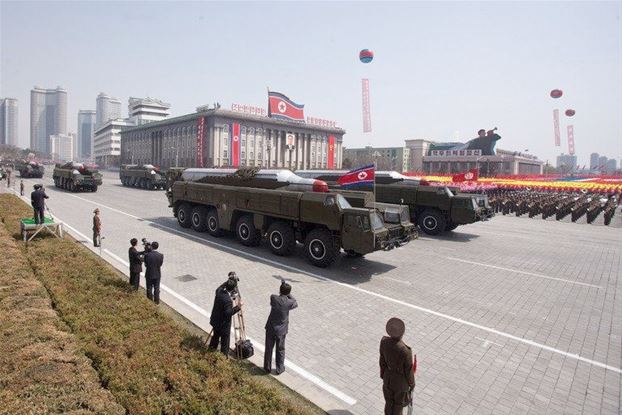North Korea removes two medium-range missiles from east coast launch site
A US official said North Korea has removed two medium-range missiles from a coastal launch site, indicating a lowering of tension on the peninsula.
Pyongyang was believed to be preparing for a launch last month, having threatened attacks in the region.
The threats followed tough new UN sanctions imposed on North Korea in March after its third nuclear test.
North Korea has been angered by wide-ranging annual US-South Korea military drills, which ended a week ago.
The news that the missiles had been removed from the site on the east coast came on the eve of a summit in Washington between the US and South Korean presidents.
South Korea’s President Park Geun-hye is to hold talks with US President Barack Obama later on Tuesday, with the two expected to reiterate a commitment to strong ties. Park, Geun-hye who took office in February, will also address the US Congress on Wednesday.
The Musudan missiles had been ready to launch at any moment but North Korea had now “moved them”, an unnamed US defense official told AFP news agency.

North Korea has removed two medium-range missiles from a coastal launch site, indicating a lowering of tension on the peninsula
A report from South Korea’s Yonhap news agency, citing an unnamed senior government source, backed that up, saying Pyongyang appeared to have lifted its highest combat alert and moved the missiles, although their current location was not confirmed.
The move is the most tangible sign yet that North Korea has stepped back from its threats to launch missiles.
But a senior US official from the National Security Council warned that, given the North’s unpredictable behavior, it was “premature to celebrate it as good news”.
Pentagon spokesman George Little, who declined to comment directly on the missiles’ reported removal, told reporters “what we have seen recently is a provocation pause”.
“And we think that’s obviously beneficial to efforts to ensure we have peace and stability on the Korean peninsula.”
Meanwhile, the Beijing-based Bank of China said it was halting transactions from North Korea’s Foreign Trade Bank.
The US imposed sanctions on North Korea’s main foreign exchange bank after the recent nuclear tests and had urged other countries, including China, to cut ties with the bank.
The Bank of China made the announcement in a statement but did not provide further details.
This is the first time that a Chinese entity has made a move against North Korean interests following the recent tension, according to reports.
North Korea unveiled medium-range Musudan missiles during a military parade in 2010 but had not yet tested them.
Last month, South Korea raised its alert level to “vital threat” amid indications that Pyongyang was preparing for a launch.
At least one ballistic missile with an estimated 2,000-mile range had been fuelled and ready for launch, according to US and South Korean sources.
A test launch would be a violation of UN Security Council Resolution 1718, passed in 2006, which states the North “must not conduct any further nuclear test or launch of a ballistic missile”.
Pyongyang had issued a series of threats in apparent response to the expanded UN sanctions and the US-South Korea drills – which saw nuclear-capable B2 and B52 bombers flown over the Korean peninsula.
These included warnings of attacks on Japan, South Korea and US military bases in the region, and a pledge to restart a mothballed nuclear reactor that produced plutonium for its weapons programme.
In addition, it shut down an emergency military hotline between Seoul and Pyongyang, and later withdrew some 53,000 workers in April from Kaesong Industrial Complex on the border with South Korea.
Kaesong complex, which was launched in 2003, employed people from both countries and was seen as one of the last remaining symbols of inter-Korean co-operation.
The final South Korean workers left the factory last week – the first time they have done so since the zone began operating 10 years ago.
However the tone of the rhetoric from North Korea has softened somewhat in recent days, observers say.
[youtube 3m4IxdcFISo]
